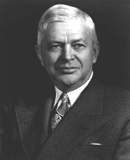Michigan Republican Party | |
|---|---|
 | |
| Chairperson | Jim Runestad |
| Senate Leader | Aric Nesbitt |
| House Leader | Matt Hall |
| Founded | July 6, 1854, in Jackson, Michigan |
| Headquarters | Lansing, Michigan |
| Student wing | Michigan Federation of College Republicans |
| Youth wing | Michigan Young Republicans Michigan Teen Age Republicans |
| Women's wing | Republican Women's Federation of Michigan |
| Ideology | Conservatism |
| National affiliation | Republican Party |
| Colors | Red |
| Michigan House of Representatives | 58 / 110 |
| Michigan Senate | 18 / 38 |
| Statewide Executive Offices | 0 / 4 |
| U.S. House of Representatives | 7 / 13 |
| U.S. Senate | 0 / 2 |
| Election symbol | |
 | |
| Website | |
| Official website | |
The Michigan Republican Party is the state affiliate of the national Republican Party in Michigan, United States, sometimes referred to as MIGOP.
Contents
- History
- Current elected Republicans in Michigan
- Members of Congress
- Statewide
- Michigan Legislature
- United States cabinet members from Michigan who served under a Republican president
- Michigan Republican State Committee
- Current leadership
- Chairmen of the Michigan Republican State Committee
- References
- External links
Ronna Romney McDaniel was the chairwoman of the party, having been elected in 2015 by delegates to the Republican State Convention, in 2017, McDaniel became Republican National Committee Chairwoman, serving until 2024. [1] The Michigan Republican Party hosts a biennial political conference at the Mackinac Island Grand Hotel called the Mackinac Republican Leadership Conference. The event features notable national Republicans, senators, governors, and presidential candidates. [2]
Even though the Michigan Republican Party has historically been characterized by conservatism, the party took a hard-right turn after Donald Trump won the presidency in 2016. [3] [4] [5] [6] After the 2020 United States elections, the Michigan Republican Party pushed false claims of fraud and sought to overturn the election results. [7] [8] [9] A months-long Republican investigation found there was no evidence of widespread fraud and recommended for the attorney general to investigate some who had made such allegations for personal gain. [10]








